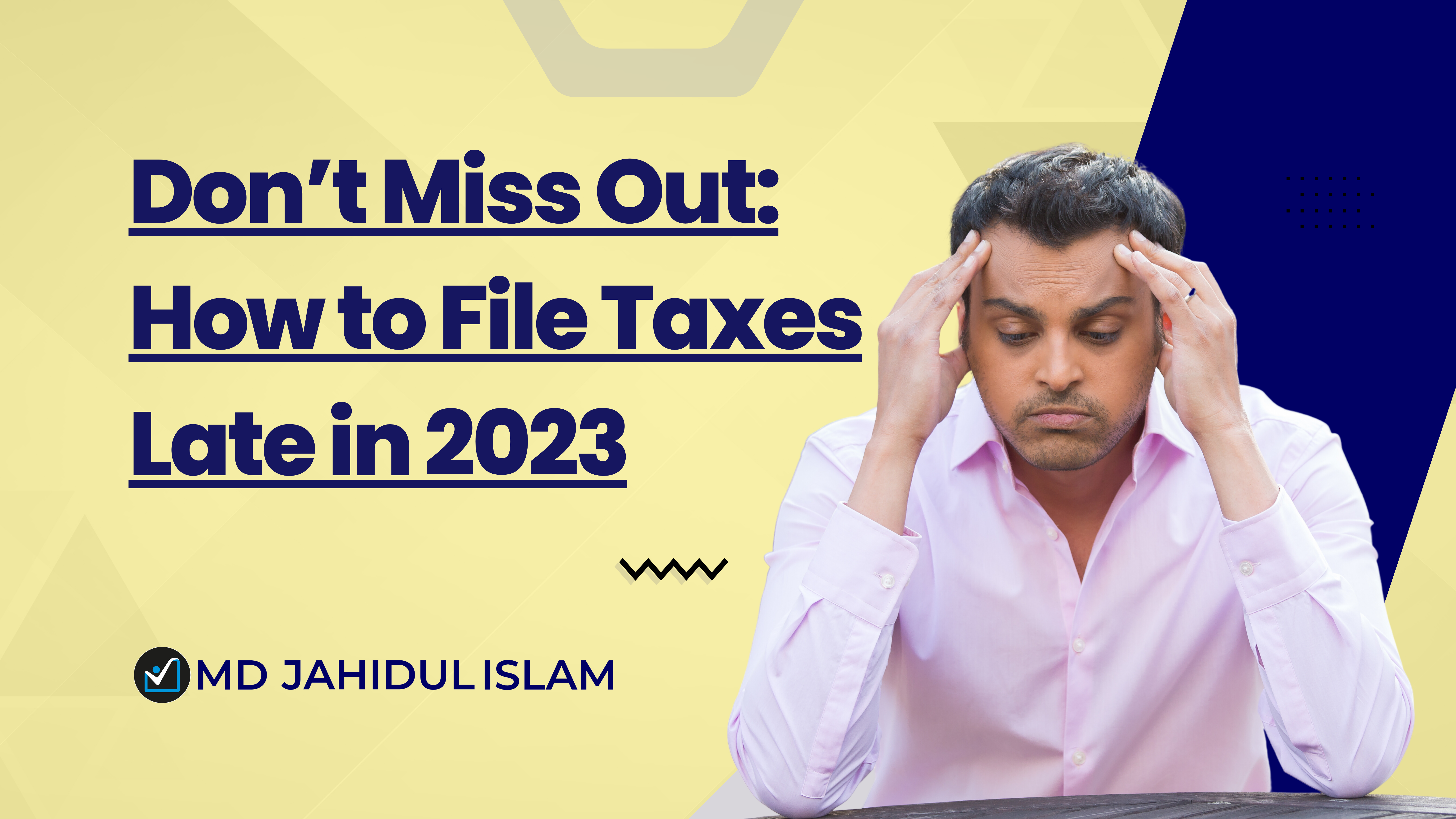Don’t Miss Out: How to File Taxes Late in 2023
Every taxpayer has the fundamental obligation to file taxes. But occasionally, circumstances arise that prevent people from making the tax filing deadline. In this post, we’ll examine what happens in 2023 if you file your taxes after the deadline and offer helpful advice to assist you avoid penalties. We will discuss the repercussions of submitting taxes after the deadline, how penalties are determined, and what you can do to lessen the financial toll of late submissions.
1. The Fallout of Delayed Taxes
Effect on Refunds
The processing of your refund, if applicable, is delayed when you file your taxes beyond the deadline. Missing the deadline can significantly delay your tax refund. If your taxes are filed on time and returned quickly, you can use your refund sooner.
Accumulation of Fines and Interest
Penalties and interest are frequently added on for late tax filings. These penalties and interest rates may increase the longer you wait to file. IRS penalties are determined according to the amount and length of the delay of tax payments. You not only face increased costs for submitting late, but you also catch the eye of the tax authorities.
Enhanced Inspection by Tax Authorities
Increased attention from tax authorities may result from late filings. If you file your tax return beyond the due date, it can be subject to more examination and scrutiny. If inconsistencies or errors are found, this enhanced scrutiny could lead to more fines and possibly legal repercussions, which can be frustrating and time-consuming.
2. Identifying Late Filing Fines
Penalty for Not Filing
When you file your taxes after the deadline without a proper extension, a failure-to-file penalty is assessed. This fine, which rises over time dependent on the amount of tax owed, is determined. The penalty, for example, is normally 5% of the unpaid tax per month or part of a month for a late return, with a maximum of 25%.
Penalty for Nonpayment
Combined with the failure-to-file penalty, a failure-to-pay penalty exists. Penalties are assessed when you do not pay the entire amount of taxes due. Failure-to-pay penalties typically amount to 0.5% of the unpaid tax amount per month or part of a month. Up to a maximum of 25% of the outstanding tax, the tax is still owed.
3. Strategies to Lower Late Filing Penalties
Immediately file your taxes
The quickest possible filing of your tax return is the best strategy to reduce fines for late files. It is still possible to avoid the failure-to-file penalty even if you cannot pay the entire amount due.Never forget that you can always negotiate a payment schedule with the IRS to pay off your tax debt gradually.
A filing extension could be requested.
An extension of time to file your taxes may be requested if you anticipate being unable to do so by the deadline.You will have more time thanks to this extension to compile the required paperwork and accurately finish your tax return. It’s crucial to remember that a filing extension does not give a payment extension for any taxes that are still outstanding.
Quickly pay any unpaid taxes.
It’s important to pay any unpaid taxes on time whether you submit your taxes on time or ask for an extension. As much of your payment as you can before the due date can help you avoid the failure-to-pay penalty.Making a partial payment even if you are unable to pay the entire amount demonstrates your good faith and helps to reduce penalties.
Examine your options for a payment arrangement
The IRS provides choices for installment agreements if you are unable to pay the full amount outstanding. You can settle your tax bill in full by making regular monthly payments under an installment plan. You can lessen the financial burden of paying your taxes all at once and avoid more severe penalties by engaging into an installment plan.
Take Professional Advice
Navigating the complexities of tax laws and regulations can be challenging. To ensure you handle your late tax filings properly, consider seeking professional assistance. Tax experts may offer knowledgeable counsel, assist you with the required documentation, and direct you through any conversations with tax authorities.
4. The Value of Maintaining Tax Records
Maintaining accurate tax records is crucial whether you file your taxes on time or suffer penalties for late filings. By maintaining thorough records of your earnings, deductions, and other relevant papers, you may prepare your tax return accurately and fast. Additionally, it enables rapid response to any tax authorities’ queries or audits.
Conclusion
Late tax filing can have serious repercussions, such as a delay in refunds, penalties, and heightened tax authorities’ scrutiny. It is essential to file your taxes as soon as you can, pay any back taxes right away, and look into options like filing extensions or installment arrangements in order to prevent penalties for late submissions. Additionally, consulting a professional can guarantee compliance with tax laws and offer helpful advice.
In 2023, there may be numerous fines and repercussions for filing taxes after the deadline. To reduce the financial impact, it’s critical to comprehend the ramifications, compute fines precisely, and act promptly. You may handle the procedure successfully and guarantee compliance with tax laws by following the advice given in this article and calling in experts when necessary.
FAQs
Q1. If I file my taxes after the deadline, will I still get a refund?
If you file your taxes after the deadline, you can still get a tax refund. The timely delivery of your return is guaranteed, nevertheless, if you file your taxes on time.
Q2. If I file my taxes late, will I be audited?
Due to the fact that tax authorities may analyze returns that were not filed on time, late filings can raise the likelihood of being audited. To reduce the chance of an audit, it’s crucial to make sure your tax return is accurate and comprehensive.
Q3. If I am unable to pay my taxes in full, can I still avoid late filing penalties?
The impact of late filing penalties can be lessened by submitting your taxes on time and making a partial payment, even if you might not be able to avoid all of them. To control your tax burden, you must get in touch with the IRS and look into opportunities for an installment plan.
Q4. What if I made a mistake on my tax return that was submitted late?
You can file an updated return to fix any mistakes you find after submitting your tax return after the deadline. To guarantee the accuracy of the updated return and resolve any potential fines or interest, it is advisable to speak with a tax expert.
Q5:What period of time should I maintain my tax records?
Depending on your particular situation, it is advised to maintain your tax records for at least three to seven years. Maintaining your tax records makes it easier to prepare future tax returns and enables you to give supporting evidence if asked by tax officials.




